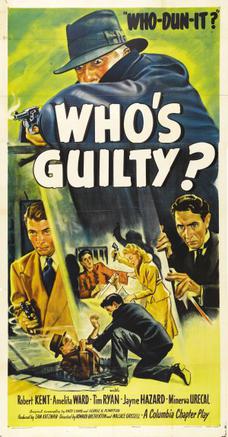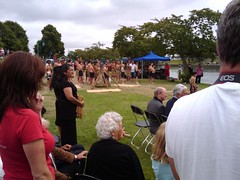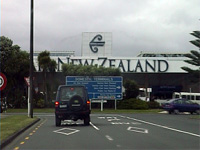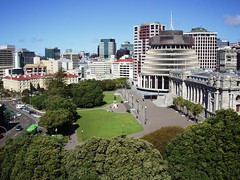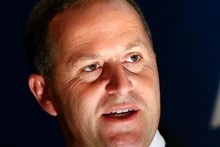
Expand
Prime Minister John Key. File photo / Martin Sykes
National's "mixed ownership model" - the innocuous-sounding vehicle tasked
with making the party's unpopular privatisation agenda more appetising -
paradoxically may yet end up making the partial sell-offs of state corporations
even less palatable to voters.
The model was supposed to take the political heat out of the issue by hocking
off minority shareholdings in a clutch of major energy-related state-owned
enterprises, rather than selling them holus-bolus.
This week the plan instead raised the temperature of the privatisation debate
and, worse, pitted supposed allies against one another.
Too late, the warning bells should be ringing in the Beehive. The model may
turn out to be one of those seductive ideas which seem to offer all the answers,
but end up stumbling under the weight of their own contradictions and unforeseen
consequences.
This week's very public stoush between the Maori Party and National over the
retention of a longstanding Treaty clause is the first such sign of trouble
ahead.
This problem should have been foreseen. Cabinet papers released under the
Official Information Act last year indicate the tricky question of whether the
catch-all Treaty protection clause in the 25-year-old State-Owned Enterprises
Act should be re-inserted into replacement legislation which will cover the
partially privatised companies looks to have been on Treasury officials' radar.
But someone forgot to tell the Maori Party.
What the wrangling over the Treaty clause has exposed is the inherent flaw in
the mixed ownership model.
Its seeming beauty when unveiled by the Prime Minister just over 12 months
ago was that it offered something to appease everyone. The new state companies
would benefit from greater commercial and market discipline through having
private shareholders. The share floats would be safe havens for small investors.
The sale proceeds would make a sizeable contribution to the capital spending
budget of a severely cash-strapped Government. All this and the state would
still retain control through its majority 51 per cent shareholding.
The latter factor - state control - is the most crucial in political terms.
But it will prove to be a myth.
It is a myth that John Key and Bill English were naturally keen to perpetuate
in the run-up to last November's election.
Ownership and control are not the same thing. Key, in particular, has
confused the two, perhaps deliberately. Moreover, the rights of minority
shareholders will have to be taken into account.
Above all, commercial imperatives will drive these entities to the exclusion
of everything else.
These restructured companies - the electricity generators Mighty River Power,
Meridian Energy and Genesis, and, the state coal company Solid Energy - will not
be accountable to the Prime Minister or Minister of Finance. They will be
expected to behave like any other privately listed company and be answerable to
the stock exchange.
It might be argued traditional 100 per cent state-owned enterprises have been
equally profit-driven and rarely, if ever, behave in anything but a corporate
fashion.
The difference is that the latter are still potentially subject to
ministerial direction and have been over such things as dividend policy and
through the drawing up of their guiding statements of corporate intent. The SOEs
are also obliged to be "socially responsible", although that has rarely been
tested.
The dispute over the Treaty clause has Labour predicting the social
responsibility provision will also not feature either when the exact working
detail of the mixed ownership model is unveiled in conjunction with the float of
Mighty River Power, the first candidate for partial sale.
Labour is probably correct. The Treasury has consistently and insistently
warned that any trade-offs to Maori or mechanisms to maintain Crown control will
depress the share price and thus reduce the receipts from the share floats.
An inadvertently released draft report setting out the terms for consultation
with Maori is also instructive as to the Government's thinking.
It declares that ministers' powers with respect to the mixed ownership model
"will not be as great" as they have under the SOE Act.
The intention was to move the restructured corporations into a framework that
applies to listed companies and create a "greater commercial focus to their
operations".
These statements, however, were exorcised from the report's final public
version. Clearly, the Government does not want the public to know yet that these
entities are going to be very different creatures from the standard SOE.
The Treasury's advice, meanwhile, notes that introducing other shareholders
into a company "fundamentally changes" governance arrangements, be it in board
appointments, voting rights or company planning.
The blueprint for the likely structure and corporate governance of these new
companies is Air New Zealand, in which the Crown has a 74 per cent
shareholding.
It was only as the result of pressure from the Auditor-General in 2003 that
Air New Zealand was made subject to parliamentary scrutiny, though only in
minimal form. The report covering the last such select committee review of the
airline in 2009 had no matters to report and stretched to all of five lines.
It is conceivable National could seek to ensure tighter control of the new
state companies through nominating directors and placing veto rights over
appointments and introducing specific Kiwishare provisions, for example, to
limit foreign ownership.
The public, however, is still under the mistaken impression that these
companies will still very much be like SOEs, albeit with some private
shareholders on board.
Key and English will have some explaining to do when the public discovers
otherwise.
So apart from retaining the dividend flow, what will be the point in the
Government maintaining ownership?
National's political opponents will see this model as proof of what they have
long been arguing - that the partial privatisations are a halfway house to full
sale and that was always National's intention. It will be a difficult charge for
National to rebut.









